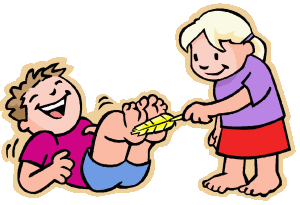Whether its your feet, armpits, stomach, or neck, many people but not everyone are ticklish. I’ve always wondered why are people ticklish, why are only some people ticklish, and why do people laugh when they’re being tickled? I myself am definitely ticklish and more places than one and can never control my laughter.
Research shows that there is a physiology behind tickling. Beneath the skin lay millions of tiny nerve endings that communicate to the brain any type of touch or exposure to things such as things that are warm or cold. These senses inform us when to take our hands off a burning pan or bundle up when it’s the winter. When such nerves are stimulated by the touch of another person, specifically one’s fingers or a feather, messages are sent through the nervous system to the brain, which is in charge of analyzing this sensory message. A tickling sensation is cause by stimulus in two sections of the brain. The first is the somatosensory cortex, which is responsible for analyzing touch and the pressure of the touch. The signal from the skin’s sensory receptors then send the message to the anterior cingulated cortex, which is in charge of pleasant feelings. When these two parts of the brain work together, they create a tickling sensation.
Some may ask, “if a tickling sensation is as simple as communication of sensory stimuli, why can’t I just tickle myself?” Tickling oneself is not possible, because the cerebellum, which is located in the back of the brain, and is responsible for governing movement can alert the brain that this stimulus is coming, and disregard the intensity of the sensation.
Touch is a powerful thing that causes physical and emotional changes, so why is it that specifically tickling results in laughter? Laughter is an involuntary reaction caused by tickling. One theory discusses that ticklishness is based on personality. Someone that has an antsy personality may have uncontrollable laughter at even the slightest touch, while people with more stern personalities don’t have even a slightly similar reaction. Also, studies have shown that although laughter is typically a reaction of glee or joy, in terms of tickling, laughter is typically the result of either social anxiety of the situation or nervous laughter.
Neuroscience professor Robert R. Provine believes that tickling is a form of communication between family, friends, and lovers because of evolution in our sexual behavior. Provine offers that explanation that, “if you think the social component is not important, try tickling a stranger.”
UC San Diego Psychologists conducted a study involving 72 undergraduate students to see if any relationship occurred between tickling and laughter. The group was divided into thirds, with different experimental conditions. The first group watched a 14 minute video of “The Best of Saturday Night Live”, followed by being tickled by a research assistant. The second group was tickled and then shown the video. The control group was shown a nature video and then tickled. To measure the tickle things such as time spent smiling, laughing, wiggling, or asking for the tickling to stop were considered. The tickling was done to multiple parts of the body from the foot, to parts of the torso, to arms. Researchers wanted to see if tickling would create a sort of “warm up effect” to see if tickling and humor shared the same underlying emotion that is mirth. The study found that tickling and humor do not share the same emotion and most of the participants found the experience to be anything but positive.
Tickling is something playful to do with friends or family to maybe show affection or play around with someone, but the laughter that comes with it is anything but playful and the science behind the tickle is a complex system of sensory communication in the brain.


This post made me laugh a lot, but not in a bad way or in the case of the people being tickled, in a nervous way. I thought it was incredibly silly that they had in essence, a tickle test. Though the researchers may have gotten some results that they expected, I can’t help but to think that the awkwardness of the situation would cause the people being studied to act a certain way. Having a random person tickle you is a lot weirder than a family member. If they changed the experiment in any way maybe they could try to incorporate more familiarity whether that be with a family member or a friend.
This was an interesting topic to write about. Now that I think about it, I’m wondering how tickling initially originated. Was someone itching something and then all of the sudden found it was sensitive and funny? It is odd to think about. I think it is maternal instinct as well, since many of us were tickled as children. Maybe it offers a quality of comfort and safety. I’m still confused how ticklishness varies from person to person. I’m not sure how this can be, whether it’s due to the genes or not. It’d be interesting if more research could be done on this in the future.
This post makes me wonder if being ticklish is heritable. For instance, I know that my mom and sister are extremely ticklish. So, my question would be, am I very ticklish because of genetics or because I a have seen the way they react to being tickled and involuntarily emulate them? Interesting post, but like most scientific mysteries, it seems like there are more questions than answers.